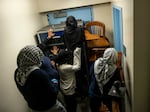
Demonstrators supporting Palestinians in Gaza barricade themselves inside Hamilton Hall, where the office of the dean is located on April 30, 2024 in New York City.
Alex Kent / Getty Images
Updated April 30, 2024 at 9:09 AM ET
Protesters began occupying a central campus building at Columbia University in New York early Tuesday morning, one day after the school asked them to voluntarily disperse from an encampment set up in support of Palestinians.
Once inside, students chained and barricaded the doors.
Hours later, the university's public safety department announced what amounts to a lockdown of the campus in Manhattan's Morningside Heights, with access restricted to essential-service employees and students who live in residential halls on the campus.
"This building has now been liberated," an Instagram account affiliated with the student group Columbia University Apartheid Divest announced as it posted an image of Hamilton Hall, echoing language used during a 1968 protest.
Columbia students protesting racism against Black people and the Vietnam War were occupying Hamilton Hall and other buildings exactly 56 years ago — on April 30, 1968 — when police violently cleared the campus. More than 700 people were arrested and almost 150 people were injured.
The school and protesters hit a new impasse on Monday
In discussions about an ongoing protest encampment on Monday, protesters did not agree to completely deconstruct the camp site, while the school did not agree to stop doing business with Israeli companies, one of student activists' demands. The school also began suspending students.
Some people left the encampment around 1 a.m. Tuesday and moved into Hamilton Hall, an academic building, began moving furniture around and refused to leave until Columbia agreed to divest from Israel.
Protesters also began climbing into open windows at John Jay Hall, a dormitory, reported WKCR, the university radio station.
The New York Police Department said at about 2:15 a.m. ET that it had officers stationed outside the university, but not on school grounds, in case the situation escalated. It did not specify the number of officers in the area. WKCR reported around 8 a.m. ET that there did not seem to be an additional buildup of police near campus.
Columbia's leadership has set several deadlines to reach an agreement with demonstrators about the encampment, as the school said it violates school policies and is a threat to campus safety, a disturbance to Jewish students and students trying to study and sleep.
Yet, no resolution was made to dismantle the tents.
"[Academic leaders and student organizers] in these discussions put forward robust and thoughtful offers and worked in good faith to reach common ground," Columbia President Minouche Shafik said Monday. "We thank them all for their diligent work, long hours, and careful effort and wish they had reached a different outcome."
Demonstrators are protesting in support of Palestinians in the war between Israel and Hamas, and they are calling for Columbia to sever its investments and business dealings with Israeli companies.
Columbia said Monday it would not do that, but it did say the school's Advisory Committee for Socially Responsible Investing will start reviewing new proposals from students. It is also pledging to make a list of its investments available to students, as well as provide resources toward health and education in Gaza.
Columbia seeks ways to hold graduation ceremony
However, the parties did agree that protests will be paused until after reading day, exams and commencement, as Shafik urged the Columbia community to consider that the class of 2024 did not get to have their high school commencement ceremonies in person due to the coronavirus pandemic.
After that, students will need to submit an application at least two days before having a protest, which will be held in designated areas, Shafik said.
Shafik said Columbia has supported protests and vigils that happened earlier in the year, as they were peaceful and didn't disturb campus operations.
But she added the encampment has caused an "unwelcoming environment" and "hostile environment" for Jewish students, and violates Title VI of the Civil Rights Act of 1964, which outlaws discrimination at schools that receive federal funding.
"Antisemitic language and actions are unacceptable and calls for violence are simply abhorrent," she said. "I know that many of our Jewish students, and other students as well, have found the atmosphere intolerable in recent weeks. Many have left campus, and that is a tragedy. To those students and their families, I want to say to you clearly: You are a valued part of the Columbia community. This is your campus too."
Shafik, who has been under fire for her handling of the protests, said she is committed to keeping community members physically safe and shielding them from harassment and discrimination, while allowing them to freely speak, which must mean respecting others' right to do so as well.
"One group's rights to express their views cannot come at the expense of another group's right to speak, teach, and learn," she said.
Copyright 2024 NPR. To see more, visit https://www.npr.org.